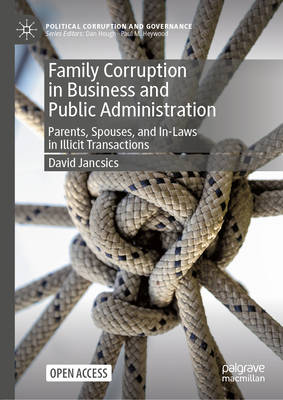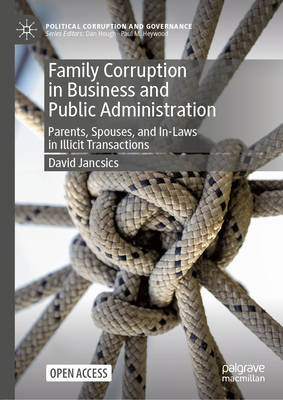
- Afhalen na 1 uur in een winkel met voorraad
- Gratis thuislevering in België vanaf € 30
- Ruim aanbod met 7 miljoen producten
- Afhalen na 1 uur in een winkel met voorraad
- Gratis thuislevering in België vanaf € 30
- Ruim aanbod met 7 miljoen producten
Zoeken
Family Corruption in Business and Public Administration
Parents, Spouses, and In-Laws in Illicit Transactions
David Jancsics
€ 53,45
+ 106 punten
Omschrijving
This open access book examines the intricate connection between family and corruption within both the realms of business and government. While corruption is conventionally characterized as a socially harmful and ethically wrong phenomenon, and family is typically viewed as fundamental to social cohesion, this book argues that these constructs frequently intersect in real-life situations. Kinship ties often function not solely as sources of emotional solidarity but also as channels facilitating illicit transactions and resource misappropriation. From minor nepotism to large-scale state capture, family relationships frequently shape how corruption is organized, justified, and sustained. Drawing on interdisciplinary theories and case material, this book develops a much-needed theory of family corruption. By challenging the conventional dichotomy that segregates family from formal institutions, the analysis reveals how deeply family relations are embedded in everyday social orders, superseding universalistic norms and overriding rational bureaucratic considerations.
Specificaties
Betrokkenen
- Auteur(s):
- Uitgeverij:
Inhoud
- Aantal bladzijden:
- 163
- Taal:
- Engels
- Reeks:
Eigenschappen
- Productcode (EAN):
- 9783032082978
- Verschijningsdatum:
- 12/02/2026
- Uitvoering:
- Hardcover
- Formaat:
- Genaaid
- Afmetingen:
- 148 mm x 210 mm
- Gewicht:
- 367 g

Alleen bij Standaard Boekhandel
+ 106 punten op je klantenkaart van Standaard Boekhandel
Beoordelingen
We publiceren alleen reviews die voldoen aan de voorwaarden voor reviews. Bekijk onze voorwaarden voor reviews.








